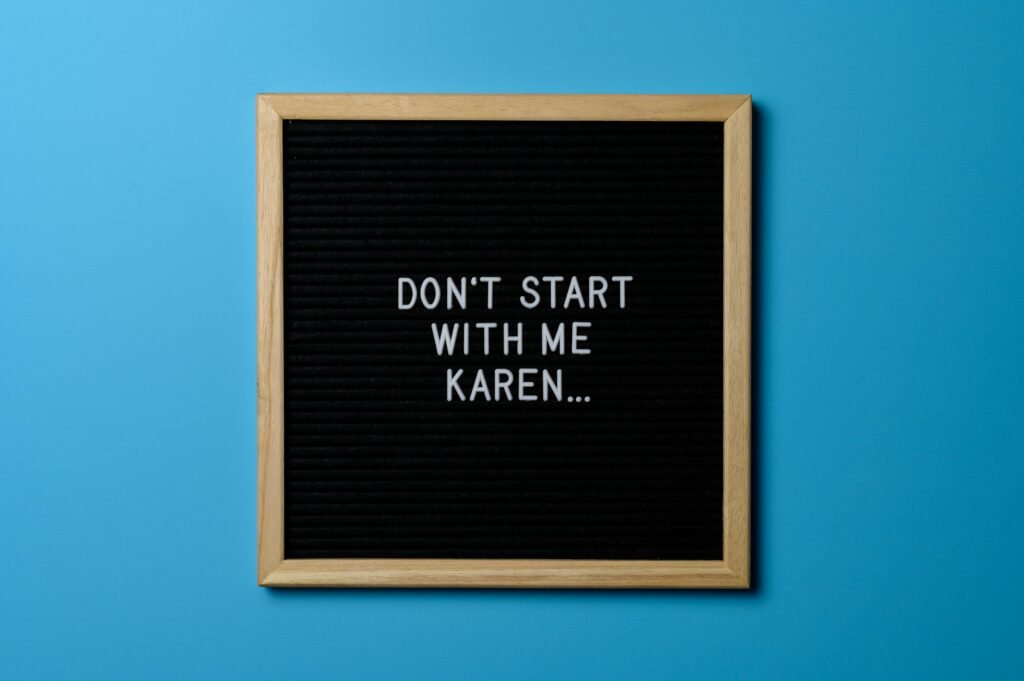Imagine a sunny afternoon in a suburban park, the air filled with the distant sound of children playing and the gentle rustle of leaves. In this serene setting, a woman, let’s call her Karen, approaches a family enjoying a picnic. With an air of unearned authority, she demands they vacate the area, claiming it as her own personal domain. Little does Karen realise that her entitled outburst is about to become the next viral sensation, catapulting her into the pantheon of internet infamy and reigniting a cultural discourse that has captivated and polarised the digital sphere.

The Genesis of Karen
The term “Karen” has nestled itself into the lexicon of internet slang with a precision that few other terms can boast. Originating from the depths of Black Twitter, the name has come to symbolise a particular stereotype of middle-aged white women perceived as entitled or demanding beyond the bounds of what is considered reasonable. The “speak to the manager haircut” and viral videos of public outbursts have become visual shorthand for this archetype.
Karen in the Cultural Lexicon
The Karen meme serves as a mirror reflecting societal attitudes towards race, privilege, and gender dynamics. It’s a cultural critique wrapped in humor, pointing a finger at the intersection of entitlement and racial ignorance. This meme isn’t just about poking fun at a particular behaviour; it’s a commentary on systemic racism and the privilege that allows certain individuals to navigate the world in a markedly different way.
The Entitlement Factor
At the heart of the Karen stereotype lies the notion of unearned privilege. This entitlement often manifests in public spaces where the Karen figure asserts her will, whether it’s in demanding special treatment or refusing to adhere to social distancing guidelines during the coronavirus pandemic. The meme captures a societal frustration with those who exploit their societal position at the expense of others.
The Digital Amplification
Social media has been the catalyst in propelling the Karen meme into the stratosphere of viral content. Platforms have become stages for these moments to be broadcasted, scrutinised, and debated. Internet culture has a way of distilling complex societal issues into digestible content, and the Karen meme is a prime example of this phenomenon.
The Intersection of Race and Gender
The Karen meme does not exist in a vacuum. It’s imbued with the complexities of race and gender dynamics. While it calls out the racial insensitivity and entitlement exhibited by some white women, it also navigates the murky waters of misogyny. The meme’s focus on middle-aged women opens up conversations about how society views and treats women beyond their “reproductive peak,” intertwining with issues of ageism.
The Backlash and the Dialogue
As with any cultural phenomenon, the Karen meme has its detractors. Critics argue that it oversimplifies complex issues and can veer into sexist territory. However, this backlash has also sparked important conversations about privilege, racism, and the ways in which societal frustrations are expressed and amplified online.
Beyond the Meme
The Karen phenomenon is more than just an internet meme; it’s a lens through which we can examine broader societal issues. It challenges us to reflect on our behaviours, prejudices, and the societal structures that enable them. As we navigate the ever-evolving landscape of internet culture, the Karen meme stands as a testament to the power of digital spaces to shape and reflect societal discourse.
In conclusion, the Karen meme encapsulates a moment in time where humour, social critique, and digital culture intersect. It invites us to laugh, question, and engage in a deeper understanding of the world around us. As we continue to decode the layers of meaning behind the Karen phenomenon, we are reminded of the power of a name to spark dialogue, challenge norms, and reflect the complexities of human behaviour in the digital age.
You might also like:


